
Yesterday was a great end to an amazing weekend power packed with advice, advancement, and general comradery concerning everything to do with bicycles and Utah. There was however one grey cloud over the beginning of the precession. Mayor Becker (of SLC) had his bike stolen yesterday, on the first day of the summit, ironically enough. He had it locked up outside across the street from the summit. For our readers who have never had a bike stolen I hope that they never have to. For those of us who have had bikes stolen we know what a bummer it can be, and hope that the Mayor can get back on a bike (preferably his) soon. We all know were there is a special place set aside for bicycle thieves.
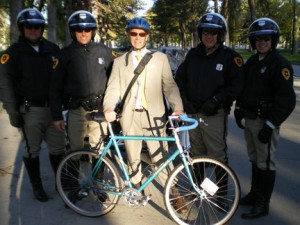
Before we begin I should warn this post is a little long. In my defense the meeting was seven hours long and pretty much packed full of important information I promise that your investment in time will pay off. Leaving the bike theft, the rest of the summit delivered just as strong as yesterday with some even more helpful insight into what we can do to make Utah, and specifically Provo, a great place to bicycle. Lets get started.
The day started with us finally being able to take part in the awesome bicycle valet parking that was being supplied by the Salt Lake Bicycle Collective. They had offered it the day before but we had arrived to early to take part. It all worked like your standard valet program. They took our bikes put a tag on them and then gave us a bracelet with a matching number. We would end up turning in the bracelet for the bicycle at the end of the day. This is the first time I have been able to take place in bike valet and it was really nice to not have to worry if my bicycle or its components were going to be where I left them when I got out of the meeting. Thanks again to all the Collective volunteers for the help and awesome service.
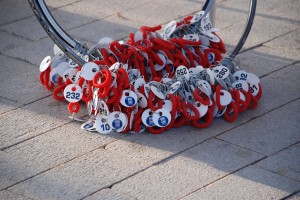
The meeting began with a welcome from Peter Corroon the Salt Lake County Mayor. He had a bit to say about the strides Salt Lake is taking to become more bicycle friendly, which we have covered, or will cover shortly. In closing he pointed out an interesting and somewhat funny  story relating the history of bicycles and cars. He stated that in New York 1896 the first car crash happened, it involved a car and a bicyclist. It drew some laughter and thought on the fact that we are still having the same problems in our transportation and urban design as we were over 100 years ago.
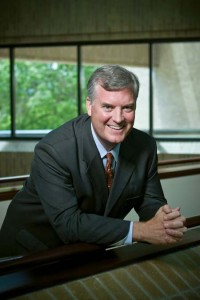
Next was a panel/audience discussion were each member of the panel presented for a few minutes, and then the floor was opened up for questions. First up was Dan Bergenthal who is a Trails Coordinator/Transportation Engineer, and works with the Salt Lake City Transportation Division. His comments were really good for people looking to get more directly involved. He began by saying that we need to be the change we want to see. This directly linked him into talking about volunteering to make that change. He spent some time on bonnevile shore line trail maintenance program. Trail maintenance is now on our families list of things to do this summer. I believe his two last points were his strongest. First, if you want bike paths on existing roads, or new roads, it is really good to know the cities Master Plan. I went to find Provo’s and it looks like the link is broken, so what we need to do now is let someone know it is down and then get a copy of the Master Plan. The second major suggestion he added was get involved with your local Bicycle Committee. He said that a majority of what happens with bicycles in SLC has to do with their Bicycle Committee. This first lecture really kicked off an underlining theme for the day that went something like, “You are in charge of what does and does not happen in your cities and communities.”
Second was Evelyn Tuddenham Bicycle and Pedestrian Coordinator for UDOT. Mrs Tuddenham spoke of the four fold mission UDOT has for their projects; improve safety, improve mobility, increase capacity, and take care of what we have. She also went into how UDOT does things when planning for roads and paths. All and all she called for cyclists to be informed and if you want to see changes or make sure that new construction has the things that will help cyclists that you need to get in on the planning and conception part of the project, right at the beginning. You will see this comment running through out the speakers and suggestions.
Third was Jerry Jouer (spelling?) who works with the Trails Department if I remember right. The reason for the vagueness is that he was not originally intended as the speaker but stepped in for someone who was to ill to attend. Primarily he spoke on how, out of all the cities, Salt Lake is the most progressive and aggressive with their bicycle infrastructure. Personally I saw this as a challenge for other cities (I am looking at you Provo), to step it up and give SLC a run for their money. Jerry did a great job for having such a limited time to prepare.
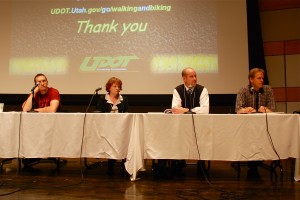
Once the third speaker was finished the floor was open to questions I will highlight the two I thought to be the most pertinent.
1. How can we change UDOT roads to be more bicycle friendly, or make them bike friendly from the get go?
As far as altering existing UDOT roads there was not a ton of response and, it all sounded a little dismal. However, there is always a silver lining. Linking back to some of the above comments the mediator for this panel Travis Jensen, an engineer and chair on the Bicycle Coalition, stated that the best way to ensure that roads will have the things we want is to make sure they are included in the official Master Plan. This way no one can make up excuses to not have a fair use road.
2.What is the Utah government, specifically UDOT, doing to clean up air pollution problems in the valley?
This question was asked by a women who has lived here five years, commutes her bicycle everyday, and because of the toxic levels of pollutants in the air at different times of the year she has developed asthma. She not only fielded the question above but added, ” Why am I being punished for doing the right thing?” Â Personally I felt that a lot of the answers coming from the panel (on this subject)Â were blanket statements more than action statements. I am also a year round bicycle commuter and am always saddened for those 3-4 weeks a year I have to take public transportation not because I want to but, because if I ride my bike I become physically ill. We need to all do our part by being aware of the air quality limiting our driving and eliminating all unnecessary idling.
We had a 15-minute break and came back for the next panel discussion “Economic Benefits of Bicycling.” This session was really good and, necessarily heavy on statistics. We’ll just highlight the really good stuff so this post does not turn into a stats class.
First up was Riley Cutler, Director of Outdoor Products and Recreation Cluster. He spoke a lot on what the bicycle industry brings to UT annually. First he spoke about Independent Bicycle Dealers (IBD) and how they benefit Ut. There are 120 IBD’s in UT bringing in about 60 million annually and employing about 1200 employees. Next he spoke about bicycle manufacturers and distributers. I had no idea we had so many but apparently there are 21 manufactures and distributers in UT with about 250 employees generating about 126 million annually. He said all of the manufacturers and distributers were part of a group called, Utah Bicycle Industry Group, I googled the name and did not find any websites that had them listed so I am not quite sure who they are. It would be nice to know though so we could better support our local suppliers. I’ll see if I can dig something up later.
Next up was Brett McIFF, Physical Activity Coordinator for Utah Department of Health. Brett named himself “The Buzz Kill.” He spoke on the Heavy Burden of Unhealthy Citizens in Ut. So the name Buzz Kill was kind of true the numbers he presented were a little daunting. Numbers like, as of 08 25.5% of UT is obese and, the total medical cost of this is about 393 million. After he presented us with some more pretty serious statistics he tied it back into why we were all there, bicycles. He spoke on many of the benefits of cycling one of the most impressive being that, riders who rode their bikes as little as 3 hours a week lowered their mortality rate by 30%. Which led in to a discussion on what all these numbers mean. If we could get just 5% of the population more active we could save 12-13 million on medical costs a year. The way to get more people active was to get them commuting to work by bicycle. To close off he said that if business would become more bicycle friendly for every $1 they invested into the bicycle programs they would see a $15 return. So, even though he had some sad numbers to show he gave us all hope that we could get more people on bicycles get the obesity rate down, raise awareness in cycling, and save businesses money.
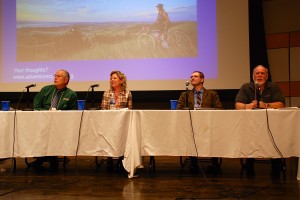
The last but far from least was Ginny Sullivan from Adventure Cycling. For any who are not familiar with Adventure Cycling follow the link and prepared to be amazed. They have tons of information on cycle touring in the U.S. and are humungous partners in getting a national trail system put together for bicyclists. I have there maps for the B.C. to California coast route, and for the San Juan Islands in WA, I have used the later and found if very useful on my tour. Ginny primarily spoke on the rise in interest that has been happening with cycle touring and the benefits it has to local economies. She said that cycle tourists generally have more to spend on food and amenities because they are not also paying for gas which is really good for cycle friendly cities that can accommodate to cyclist. She also showed a lot of awesome pictures that really made me want to go ride my bike. As I was sitting looking at the pictures I realized this Summit was the first times that bicycles were prohibiting me from being outside on a gorgeous day, it made me chuckle a bit. To finish up Mrs. Sullivan said that one way a community can become more bike friendly quick is better signage. I could not agree more here in Provo we could use better signage on the Provo River Trail and on the bike lanes telling where things were leading and where different directions will take you if you veered off the path. Hopefully we can see some change  with this in the coming months.
This second round of panelist did great and the final speaker really got me longing for the outside. There was one thing that all three of them mentioned that I did not above which is the Wisconsin Bicycle Impact Study. Provo, or any were in UT is a ways off from anything like this but, it is a great model of seeing how investing in bicycle infrastructure (government end), and bicycling (our end), can make a big difference on local and state economies.
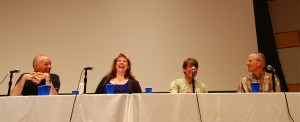
The last panel of the day was by far the most entertaining primarily due to the interactions of Councilman Garrott, and Representative Jen Seelig’s interactions. As this panel sat down and especially as the first two panelists began to introduce themselves, and the very animated Representative Seelig reacted to them, I was really worried this discussion was going to be about anything but bicycling and working with policy-makers. It turned out though that the Representative was just giving everyone a hard time, and they all ended up playing nicely. A lot of what was said was done so in a more dialogue format so sticking with the format above I will just highlight some of the main ideas.

Senator Wayne Niederhouser was on this panel and had a lot of really inspiring and honest things to share with bicycling citizens. He let us all know that he is an avid cyclist and in support of cycling, which has been made apparent with the help he has given on the Share the Road plate and on sponsoring the Idaho Stop Law. While mentioning all of this he said that there is more bicycle friendly legislation on the way and we need to make sure to support it (don’t worry this is one of the reasons bikeprovo is here you will all know about up and coming stuff with time to act.) His main purpose was to let us know that the state legislature is way more bicycle friendly than you would expect. This encouragement however came with a sobering reality, “Car is still king that is what prevails still in the legislature. We need to get people more educated on bicycling…we will see more funding for these issues with this (education) change.”
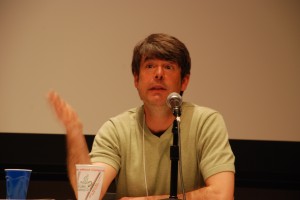
I really enjoyed Councilman Garrot’s comments. Mainly because I am a sucker for philosophy and he quoted Aristotle. Seriously though the councilman had a calm and thought out approach to his introduction and answers. He said that there is no need to be harsh with or overly pressure politicians. He seemed to be critical of some political processes but, when the comment was made that our state politicians are mostly all good people trying to create the greatest good he shook his head up and down with the clarification that “…they all just do not agree on what is the greatest good.”
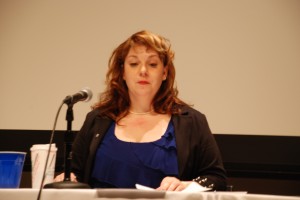
This is the only steady picture I have of Representative Seelig. As I said before she was very animated, which made it hard to get an in focus picture in low light. Both me and Tod respected Representative Seelig and her honest approach to things. If she did not know something she said she did not know, if she had an opinion about something she would let you know. All and all she had a lot to say about understanding were people are coming from and trying to understand what they believe to be the right thing. Just as the two panelists above she asked us to see politicians as people who are sometimes hard to get ahold of. To give politicians the benefit of the doubt for the first little while and then, if they do not respond, go ahead and turn on the heat. Finally the point that impressed me the most was the question “why does it matter right now?” This phrase meaning, if you want to make a change why did you not act until the last minute.
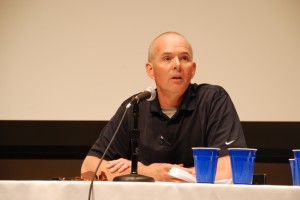
Deputy Director Braceras is or was an avid cyclist (never really clarified), and as a result when he was younger he, his brother, and his sister all road bicycles from New Jersey to San Francisco. I bet that was a great ride and as someone pointed out later, one that will be with him his whole life. Director Braceras followed a lot in the same vein as everyone else asking us to remember that nobody is perfect and if they appear to be the,”…they probably have never had to make any real decisions.” He also called citizens to be civil, be involved, and to build a legacy between citizens and state agencies.”
All and all when this panel was finished I felt a little more confident in our state officials and their ability to help bicyclists. It is possible that it could have just been political talk but, I honestly feel like our local officials really do want to hear from us and really do want to know what we would like to see happen in the cities and states that we live. As long as we are aware of what we are asking, and trying our best to, at the least, be cordial in our efforts.
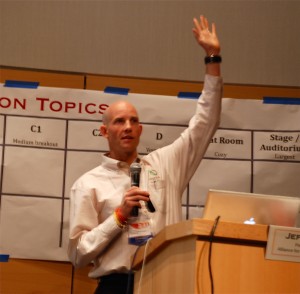
The final speaker of the Summit was Jeff Miller from Alliance for Bicycling and Walking. Jeff spoke both days of the Summit and for good reason he has tons of information on promoting cycling wether on a community or state level. This time around he touched on a lot of the same topics he just dove deeper into some of the more important ones. I am only going to touch on the new material so if you feel like you are missing anything check out yesterdays post.
For the most part Jeff concentrated on specific programs to help cyclist feel capable and to make cycling more safe. There was a lot of talk on Bike Share Programs and on Sunday Boulevards. Â He also encouraged everyone to say the word ‘bicycle’ every-time they had a chance. He said to not be scared to stand up at a city meeting talking about transportation and say “what about bicycles”, even if you are not sure what should be done. He pointed out that we are the citizens and that if we raise the concern but are not sure on a plan it is not necessarily our job to come up with one (even though if we have a plan we will probably get better results), it is the cities job or which ever civil servant we raised the issue with. He also spoke a lot on education and helping people to see that you do not have to be Lance Armstrong to ride a bicycle. In his closing remarks he brought up a really awesome point which tied right back into the idea of getting things done civilly that we had been seeing through out the whole conference. He said that “everyone has a story”, almost everyone has ridden a bicycle, and almost everyone has at least one good memory from riding bicycles. It is our job to find those stories and to help those we want to help us how important the bicycle is and can be to so many people.
Once Jeff finished up we did another break out session were I learned of some of Salt Lakes plans for bicycle boulevards. But, that will have to wait for another post.
This first annual Bicycle Summit was a real success. We at bikeprovo would like to thank everyone who helped put this event on. My only criticism  is that I did feel it was a little Salt Lake centric. I can understand why it was SLC centered but, Provo really needs to be a bigger part of bicycling in UT, and a bigger part of the summit next year. We now have a lot of information and a lot of direction. Now the plan is to get stuff done. If we only learned a few things from this Summit it was that, our voice counts, we need to be informed, and we need to be united. The best part of all of this is that it is enabled by riding our bikes one of the most simple and enjoyable things we can do, especially on days like we have been having. So, my suggestion is as it usually is, get outside and ride your bike, I know that is were I am headed.
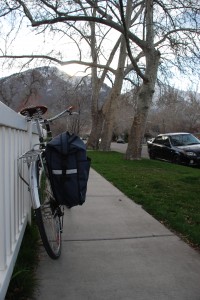

I agree on the unintended focus on Salt Lake City, but what a first for our great state! Thanks for the report Zac.
Thanks for the great write-up. The summit was an impressive first step. Hopefully next year Provo will have someone on stage to talk about what we’ve done and where we need to go. Maybe that will be you?
It’s great to read your perspective on the summit! We would love for you to be more involved next year and to help us shift the focus to communities all over Utah.
Thanks for the support guys. Liat I would love to got invovled with the summit next year. If you want email bikeprovo and I will send you my email so we can stay in contact.